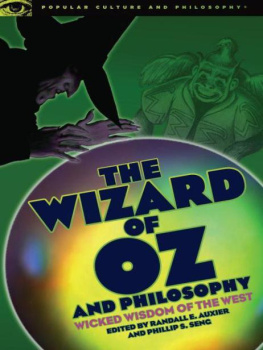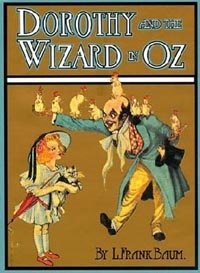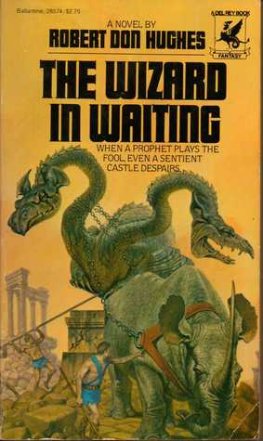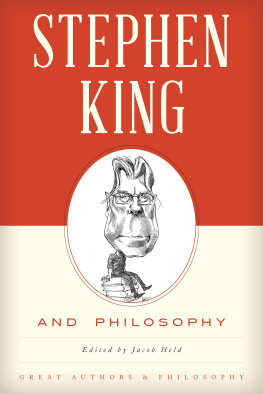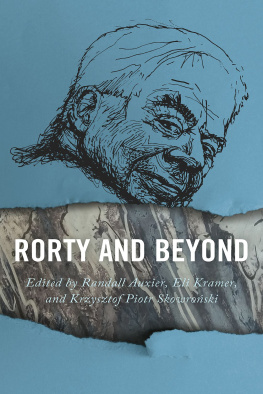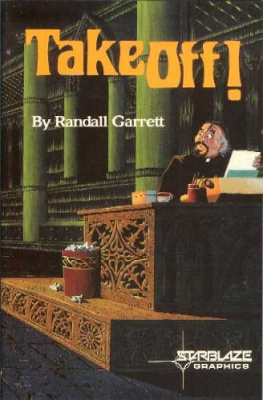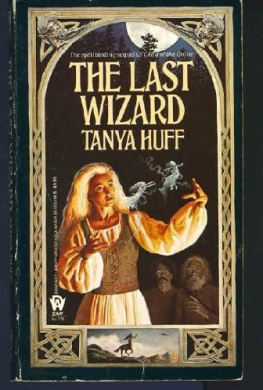Randall E. Auxier - The Wizard of Oz and Philosophy
Here you can read online Randall E. Auxier - The Wizard of Oz and Philosophy full text of the book (entire story) in english for free. Download pdf and epub, get meaning, cover and reviews about this ebook. genre: Romance novel. Description of the work, (preface) as well as reviews are available. Best literature library LitArk.com created for fans of good reading and offers a wide selection of genres:
Romance novel
Science fiction
Adventure
Detective
Science
History
Home and family
Prose
Art
Politics
Computer
Non-fiction
Religion
Business
Children
Humor
Choose a favorite category and find really read worthwhile books. Enjoy immersion in the world of imagination, feel the emotions of the characters or learn something new for yourself, make an fascinating discovery.
- Book:The Wizard of Oz and Philosophy
- Author:
- Genre:
- Rating:3 / 5
- Favourites:Add to favourites
- Your mark:
- 60
- 1
- 2
- 3
- 4
- 5
The Wizard of Oz and Philosophy: summary, description and annotation
We offer to read an annotation, description, summary or preface (depends on what the author of the book "The Wizard of Oz and Philosophy" wrote himself). If you haven't found the necessary information about the book — write in the comments, we will try to find it.
The Wizard of Oz and Philosophy — read online for free the complete book (whole text) full work
Below is the text of the book, divided by pages. System saving the place of the last page read, allows you to conveniently read the book "The Wizard of Oz and Philosophy" online for free, without having to search again every time where you left off. Put a bookmark, and you can go to the page where you finished reading at any time.
Font size:
Interval:
Bookmark:

Table of Contents
Popular Culture and Philosophy
Series Editor: George A. Reisch
VOLUME 1
Seinfeld and Philosophy: A Book about Everything and Nothing (2000)
VOLUME 2
The Simpsons and Philosophy: The Doh! of Homer (2001)
VOLUME 3
The Matrix and Philosophy: Welcome to the Desert of the Real (2002)
VOLUME 4
Buffy the Vampire Slayer and Philosophy: Fear and Trembling in Sunnydale (2003)
VOLUME 5
The Lord of the Rings and Philosophy: One Book to Rule Them All (2003)
VOLUME 6
Baseball and Philosophy: Thinking Outside the Batters Box (2004)
VOLUME 7
The Sopranos and Philosophy: I Kill Therefore I Am (2004)
VOLUME 8
Woody Allen and Philosophy: You Mean My Whole Fallacy Is Wrong? (2004)
VOLUME 9
Harry Potter and Philosophy: If Aristotle Ran Hogwarts (2004)
VOLUME 10
Mel Gibsons Passion and Philosophy: The Cross, the Questions, the Controversy (2004)
VOLUME 11
More Matrix and Philosophy: Revolutions and Reloaded Decoded (2005)
VOLUME 12
Star Wars and Philosophy: More Powerful than You Can Possibly Imagine (2005)
VOLUME 13
Superheroes and Philosophy: Truth, Justice, and the Socratic Way (2005)
VOLUME 14
The Atkins Diet and Philosophy: Chewing the Fat with Kant and Nietzsche (2005)
VOLUME 15
The Chronicles of Narnia and Philosophy: The Lion, the Witch, and the Worldview (2005)
VOLUME 16
Hip Hop and Philosophy: Rhyme 2 Reason (2005)
VOLUME 17
Bob Dylan and Philosophy: Its Alright Ma (Im Only Thinking) (2006)
VOLUME 18
Harley-Davidson and Philosophy:
Full-Throttle Aristotle (2006) Edited by Bernard E. Rollin, Carolyn M. Gray, Kerri Mommer, and Cynthia Pineo
VOLUME 19
Monty Python and Philosophy: Nudge Nudge, Think Think! (2006) Edited by Gary L. Hardcastle and George A Reisch
VOLUME 20
Poker and Philosophy: Pocket Rockets and Philosopher Kings (2006) Edited by Eric Bronson
VOLUME 21
U2 and Philosophy: How to Decipher an Atomic Band (2006) Edited by Mark A. Wrathall
VOLUME 22
The Undead and Philosophy: Chicken Soup for the Soulless (2006) Edited by Richard Greene and K. Silem Mohammad
VOLUME 23
James Bond and Philosophy: Questions Are Forever (2006) Edited by James B. South and Jacob M. Held
VOLUME 24
Bullshit and Philosophy: Guaranteed to Get Perfect Results Every Time (2006) Edited by Gary L. Hardcastle and George A. Reisch
VOLUME 25
The Beatles and Philosophy: Nothing You Can Think that Cant Be Thunk (2006) Edited by Michael Baur and Steven Baur
VOLUME 26
South Park and Philosophy: Bigger, Longer, and More Penetrating (2007) Edited by Richard Hanley
VOLUME 27
Hitchcock and Philosophy: Dial M for Metaphysics (2007) Edited by David Baggett and William A. Drumin
VOLUME 28
The Grateful Dead and Philosophy: Getting High Minded about Love and Haight (2007) Edited by Steven Gimbel
VOLUME 29
Quentin Tarantino and Philosophy: How to Philosophize with a Pair of Pliers and a Blowtorch (2007) Edited by Richard Greene and K. Silem Mohammad
VOLUME 30
Pink Floyd and Philosophy: Careful with that Axiom, Eugene! (2007) Edited by George A. Reisch
VOLUME 31
Johnny Cash and Philosophy: The Burning Ring of Truth (2008) Edited by John Huss and David Werther
VOLUME 32
Bruce Springsteen and Philosophy: Darkness on the Edge of Truth (2008) Edited by Randall E. Auxier and Doug Anderson
VOLUME 33
Battlestar Galactica and Philosophy: Mission Accomplished or Mission Frakked Up? (2008) Edited by Josef Steiff and Tristan D. Tamplin
VOLUME 34 iPod and Philosophy: iCon of an ePoch (2008) Edited by D.E. Wittkower
VOLUME 35
Star Trek and Philosophy: The Wrath of Kant (2008) Edited by Jason T. Eberl and Kevin S. Decker
VOLUME 36
The Legend of Zelda and Philosophy: I Link Therefore I Am (2008) Edited by Luke Cuddy
VOLUME 37
The Wizard of Oz and Philosophy: Wicked Wisdom of the West (2008) Edited by Randall E. Auxier and Phillip S. Seng
IN PREPARATION:
Jimmy Buffett and Philosophy (2009) Edited by Erin McKenna and Scott L. Pratt
Stephen Colbert and Philosophy (2009) Edited by Aaron Allen Schiller
Radiohead and Philosophy (2009) Edited by Brandon Forbes and George A. Reisch
The Golden Compass and Philosophy (2009) Edited by Richard Greene and Rachel Robison
Ideas and Images of Oz
RANDALL E. AUXIER and PHILLIP S. SENG
J ust about everyone loves The Wizard of Oz . But why? What is it about this tale that inspires agreement, admiration, nostalgia, even joy, among people who couldnt normally agree on what day of the week it is?
Part of it is that everyone likes stories. But we only rarely like the same storiesyes, there is the standard list, including everything from Noahs Ark up to Peter Pan . The first Oz story makes that distinguished list of universally beloved stories, and it seems to have great staying power. Its difficult to imagine a time when people wont want to hear the story, in one form or another. But why do a few stories captivate every generation while most are ignored? And specifically, why the tales of Oz?
Sometimes its a good idea to go to the source, to a practitioner of an art. We decided to ask a professional storyteller, Chris Chandler, his opinion. He made the observation that the Oz story shifts for us as our needs, sentiments, and perspectives shift. Oz isnt a single story, he said, its a whole collection of stories organized around a common quest, like the Iliad and the Odyssey . As in those classic tales, we can understand the whole story from the perspective of any of the main characters, depending on where we find ourselves at a given moment. Sometimes we identify with the Lion, see the whole of Oz from his perspective, or later with the Tin Man, or with Dorothy, even Toto the dog or the Wicked Witch (as Gregory Maguire has recently reminded us).
Chandler thinks that the power of a story to shift and show itself to us anew is part of what attracts people to it, at different ages, in different moods, with different concerns. No matter where we are in life, the best stories offer us something to consider, to feel, and to think on. Like the Iliad and Peter Pan , The Wizard of Oz is good for that, a sort of dynamic plurality of tales, all joined by icons and archetypes that we can use on a daily basis, to understand ourselves and others. There are as many Ozzes as there are situations in which it comes to mind.
And there are some philosophical ideas in The Wizard of Oz that everyone gets right away. Theres no place like home may seem purely sentimental, but with a little reflection it takes on greater depth. For example, why do we say this in negative terms no place like it? If we think logically enough, it seems to mean that even home itself isnt like home, since no place is. But thats too literal, right? Only a philosopher would notice that . But hold your balloon down for a minute. One point of the story is that the home Dorothy left isnt like the home she returned to, because she is different, and she is part of what home means. Even if all the other stuff is the same, Kansas has a new Dorothy. Many people have noticed things like this in pondering the Oz stories. This thought about home is sort of an idea, but there are also images to consider.
One of the more enduring images of The Wizard of Oz is that of the Yellow Brick Road. L. Frank Baum wrote of a road of yellow brick, but the road really comes to life for most of us in the 1939 movie, where the Yellow Brick Road stands in sharp relief against the green of the forest, red of the poppies, and blue of the sky; all of which counter the drab, sepia-toned Kansas. The Yellow Brick Road provides a valuable metaphor for making sense of Dorothys sagait brings to visible awareness the notion of a journey or adventure, and relates the story to all the adventure epics written before. Sometimes we want to go where that road leads and sometimes we dont, but even in rejecting the destination, we need the image.
Next pageFont size:
Interval:
Bookmark:
Similar books «The Wizard of Oz and Philosophy»
Look at similar books to The Wizard of Oz and Philosophy. We have selected literature similar in name and meaning in the hope of providing readers with more options to find new, interesting, not yet read works.
Discussion, reviews of the book The Wizard of Oz and Philosophy and just readers' own opinions. Leave your comments, write what you think about the work, its meaning or the main characters. Specify what exactly you liked and what you didn't like, and why you think so.

